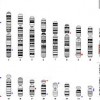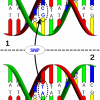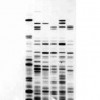Posts tagged technology

What is Bioinformatics?
May 8th
Bioinformatics is a relatively new field and as such, many people aren’t exactly sure what “bioinformatics” really is.
The NIH Biomedical Information Science and Technology Initiative defines bioinformatics as:
“Research, development, or application of computational tools and approaches for expanding the use of biological, medical, behavioral or health data, including those to acquire, store, organize, archive, analyze, or visualize such data.”
Still confused? Don’t fret, most people are when they hear that definition. I usually like to tell people:
“Bioinformatics combines the latest technology with biological research.”
Over the past decade or so, and even prior, computers have become an integral part of every industry. Biological More >

Made to Order
Sep 12th
Preimplantation genetic diagnosis (PGD) is a technique that allows scientists to screen embryos after fertilization through In Vitro Fertilization (IVF), to prevent the transmission of serious genetic diseases for couples who are at risk. It also can be used to screen the egg and sperm before fertilization occurs. Only unaffected embryos will be transferred to the uterus for implantation.
Image from Nature Reviews Genetics 3, 941-955 (December 2002)
While this technology offers the hope to increase the success of IVF, it does raise some concerns about choosing a child in order to meet the needs and desires of parents. While most cases seem to have More >

Human Genome Project
May 25th
The initial goal of the Human Genome Project was to find, map and sequence all of the genes within the human genome. Since the completion of the initial draft back in 2000, the White House predicted that this would lead to a new era of molecular medicine, bringing new ways to prevent, diagnose, treat and cure disease.
It has been amazing to see what we have learned since then, but even more interesting to think of where this could go in the future. Hopefully soon we will be able to apply this on a more individual basis, with people being able to More >

The Future of Medicine
Oct 13th
Emerging DNA technologies continue to offer us many new insights into our genome, and its implications on human disease. One area that is currently under much scrutiny is how different patients are responding differently to certain drug treatments. Researchers are now finding that some people have a genetic predisposition to how they will react to a drug. If there is some way that we could detect this in the doctor’s office as they are writing the prescription, it would help save time and lives as we try to combat these diseases.
The Imperial College London and its affiliate-company DNA Electronics have More >

DNA Authentication
Sep 2nd
While recent advances in DNA technology have revolutionized the field of forensic science, it also makes us question whether or not the evidence at a crime scene is genuine. Basic techniques such as PCR, molecular cloning, and the most recent whole genome amplification, allow for someone to synthesize DNA under any genetic profile in vitro. This artificial DNA can then be implanted into human tissues or placed on the surface of objects, and planted at a crime scene. Current forensic procedure cannot distinguish between artificial and natural DNA samples.
The company Nucleix is now offering a tool to distinguish between natural and More >
